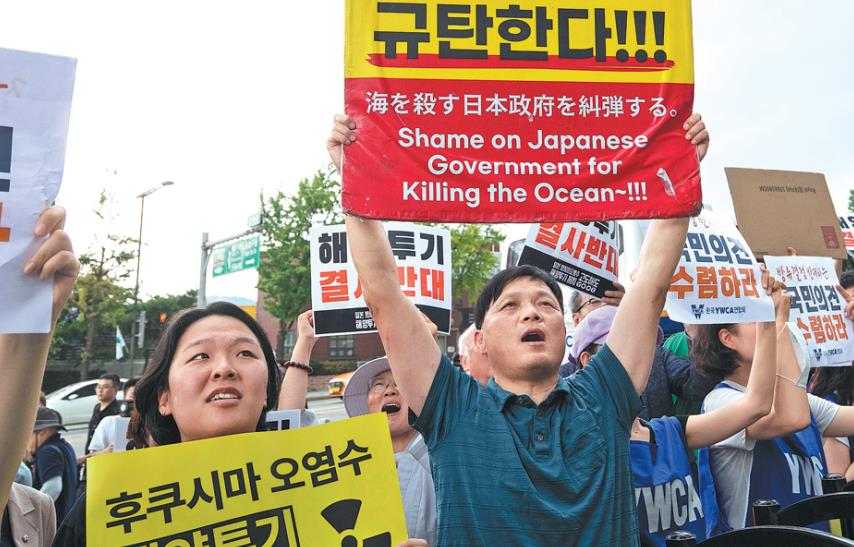Japan's move dubbed 'terror' act
By YANG HAN in Hong Kong | China Daily | Updated: 2023-08-24 09:25
ROK's opposition parties, civic groups protest against discharge plan

Opposition parties and civic groups in the Republic of Korea have stepped up their urgent efforts to press the Japanese government to immediately stop its plan to release Fukushima's nuclear-contaminated water into the ocean.
"Japan's nuclear wastewater discharge is likely to be recorded as the second Pacific War in history," said Lee Jae-myung, leader of the country's main opposition Democratic Party, in Seoul.
In a meeting of the party's supreme council at the National Assembly on Wednesday, Lee said that Japan, which had threatened its neighbors' right to survive in the past due to its imperialist war of aggression, is about to bring another irreversible disaster to the ROK and Pacific Rim countries.
Condemning Japan's plan as an act of "terror", Lee said the Japanese government is solely responsible for any future damage caused by its act of dumping nuclear-contaminated water into the ocean.
Despite protests both in and beyond the country, the Japanese government said on Tuesday it had decided to start releasing nuclear-contaminated wastewater from the crippled Fukushima Daiichi nuclear power plant on Thursday, if the weather and ocean conditions allow.
The Tokyo Electric Power Company, the operator of the power plant, had said earlier that it plans to discharge nuclear-contaminated water for the next 30 years through an underground pipeline.
Following Japan's announcement, Park Ku-yeon, the first deputy chief of the Office for Government Policy Coordination, said the government of the ROK sees no scientific or technical problems with the plan.
However, concerns over the plan to discharge more than 1 million metric tons of nuclear-contaminated water are mounting in the ROK, one of the world's biggest seafood consumers and producers, especially among its environmental groups and those related to the fisheries industry.
In an emergency meeting held on Wednesday, Jeju Island Province Governor Oh Young-hun said the ROK government should actively engage with Japan and demand the withdrawal of its plan.
"Considering the obvious negative impact on sea women, fishermen and the fisheries industry, the South Korean government should use all means, including international alliances, to ask Japan to withdraw the discharge plan of the contaminated water," Oh was quoted as saying by the Jeju Environment News.
Chang Ma-ri, a climate energy campaigner for Greenpeace in Seoul, said the flawed understanding of nuclear power plants was behind the ROK government's decision to accept Japan's release plan and its energy policies.
Risks unexamined
"President Yoon Suk-yeol's government did not fully examine the risks of the release plan and did not request international legal rights such as temporary measures to suspend the discharge. It will not be free from the judgment of the times," said Chang, in a statement posted on Greenpeace's website.
Civic group Environmental Justice said in a statement that the sea is not owned by the Japanese government. Hence, the decision to release nuclear-contaminated water should not have been made simply based on inspections that had been conducted as a mere formality, along with the consent of several related parties.
"The Japanese government's decision has set a precedent, creating an indulgence for all countries that operate nuclear power plants to be allowed to dump radioactive contaminated water into the sea," the statement said.
The Korean Confederation of Trade Unions, which held a joint news conference in front of the Yongsan Presidential Office in Seoul on Wednesday afternoon, said the discharge of nuclear-contaminated wastewater is the first price that the ROK has to pay for the trilateral meeting that was held on Aug 18 with the United States and Japan.
"The Yoon Suk-yeol government said it 'neither approves nor opposes' the plan," the confederation said in a joint statement. "An accomplice in a crime will say the same. They are just conspiring with crime."
As part of a 72-hour emergency action plan, the participating groups said they would hold protests in front of the presidential office to demand face-to-face talks with Yoon.
























